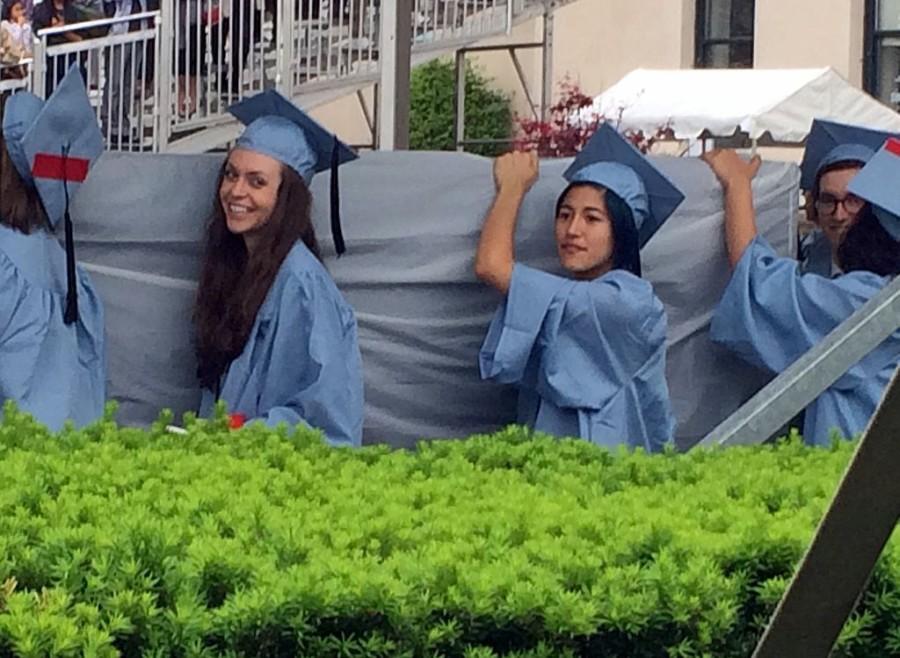Columbia and the monster under the bed
Cleveland in color
An extra-long, dark blue mattress made its way across the stage during Columbia University’s graduation ceremony this May. As part of her senior thesis, visual arts student Emma Sulkowicz had been toting the mattress with her since September 2014, and vowed to do so until her alleged rapist – colleague, Paul Nungesser – was expelled from Columbia.
Sulkowicz accused Nungesser in April 2013. The university held a hearing but cleared Nungesser of any responsibility. When Sulkowicz came forward, two other women also accused Nungesser of different forms of sexual misconduct, ranging from rape to assault.
To date, though, Nungesser has denied all responsibility, and went as far as suing the university for gender discrimination. Permitting Sulkowicz’s project to continue, he claims, was a deliberate attempt to bully him out of the school.
Predictably the case boasted extensive media coverage and customary concurrent web trolling. If Nungesser felt bullied, we can only imagine what Sulkowicz felt when posters of her face were plastered around campus, complete with the charming caption: #RAPEHOAX.
The elephant in the room – or mattress, in this case – hasn’t budged much despite efforts from friends in high places. President Barack Obama’s White House Task Force to Protect Students from Sexual Assault was founded in January 2014, with the mandate to strengthen federal enforcement and provide institutions with tools to prevent sexual assault. In May 2014, the U.S. Department of Education released a list of higher education institutions with open Title IX sexual violence investigations.
The goals are noble enough – safety, justice, transparency, prevention. But, to Sulkowicz, her art was the only way to attain perceived justice. It’s no wonder that she took this silent battle to bed. An estimated one in five women are sexually assaulted during college, but it takes a particular breed of courage to literally pick up your baggage and take it with you wherever you go. Sulkowicz communicated to the campus – and the world – “this is where he hurt me, and this is what I will carry with me forever.”
She shares this story with countless other women (and men), many who suffer in silence. Sulkowicz’s performance is indicative of the cultural undercurrent pushing against the societal norm, the monster under the bed. When it comes to a topic as taboo as the unsullied, young female body, we are quick to stitch things up. In addition when cases end in favor of the attacker, women are further deterred from revealing their wounds to a jury.
We are quick, as Americans, to judge corrupt sexual practices in other countries, but when it comes to our own home turf, hypocrisy sits where reason should. We don’t allow murderers, serial killers or pedophiles to attend universities – but rapists are slapped on the wrist, told to zip up their fly and study hard for their upcoming exams.
This is not to say that there are no “fake” accusations, or that no university has been proactive about its sexual assault hearings. But I doubt Sulkowicz would express this profound vulnerability and pain over an imagined event.
Let’s say poor Nungesser is innocent, just your average Joe, caught in the wrong place with the wrong girl. Is it likely Sulkowicz would randomly assign him the title “rapist,” then spend months of her life dragging around a shoddy dorm mattress? Unlikely.
In light of the controversy, her performance remains incredible to me, a beacon for all young women who never got the justice they deserved. I’m not alone in my admiration. Sulkowicz has received a number of awards since her art piece garnered international attention. To date, “Carry that Weight” protests shot up in 130 different campuses in the United States.
It all hits close to home. Four years ago, as an undergraduate, I met three girls studying in three separate disciplines, each with her own sexual assault skeleton in the closet. None of them took the violence to campus police. Their reasons ranged: they didn’t want their family to know; they doubted the police would do anything; they wanted to forget that it happened; they didn’t want to put their graduate application in jeopardy with a sexual assault hearing.
One of these women tells me now, four years after her attack, that she has no regrets about not pressing charges. Rather, she regrets not doing something about it herself.
“He is in medical school,” she said. “If I knew then what I knew now – that I have a voice, that I’m not alone, that I wasn’t ruined – I would have carried a hundred mattresses. I would have carried the entire dorm room. And camped outside of every one of his classrooms on the quad, in the clothes he took off me.”
“But I was 19,” she continued. “The Columbia case would have inspired me back then, sure. I realize there are moments where you have to go above the law to get justice. Or go above the law to change the law. That mattress she carried transformed because of her. It entered her life as the symbol for her demise. It left her life as the ultimate symbol of empowerment.”
Sarah Jawhari is a student at the Case Western Reserve University School of Dental Medicine.


